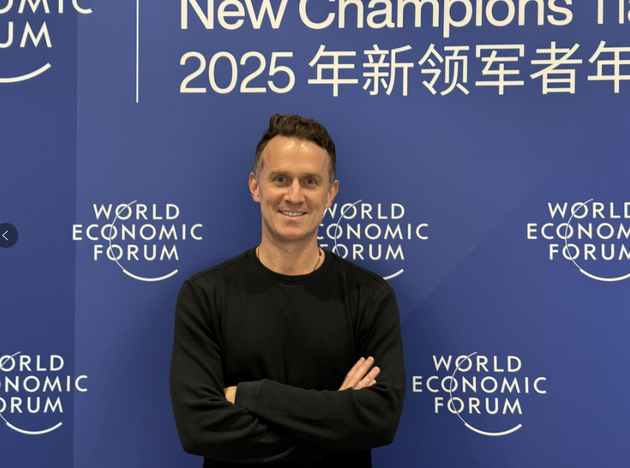Brain-computer interfaces (BCIs) are heralded as a transformative frontier in neuroscience, promising to enhance the quality of life for over 3 billion people globally affected by neurological disorders. However, the path from clinical breakthroughs to mainstream adoption remains long and complex.
At the 16th Annual Meeting of the New Champions of the World Economic Forum held on June 24 in Tianjin, National Business Daily (NBD) spoke with Tom Oxley, founder and CEO of U.S.-based brain-computer interface company Synchron.
Oxley said that while medical applications of BCI technology could receive regulatory approval within 3 to 5 years, consumer-grade brain implants will likely require at least 15 to 20 years of technological evolution and regulatory navigation.
"Even if we receive regulatory approval soon, the initial use will remain strictly medical," Oxley said to NBD. "Bridging from therapeutic to consumer applications will require a long runway of iteration, safety validation, and social acceptance."

Tom Oxley Photo/Sun Yuting (NBD)
BCI Technology to be Applied in Medical Scenarios in 3 to 5 Years
Unlike Elon Musk's Neuralink, which relies on invasive open-skull surgery, Synchron has developed a vascular-delivery technique that inserts electrodes through blood vessels to the motor cortex. This innovation eliminates the need for craniotomy and simplifies scalability.
In 2019, Synchron became the first company to launch clinical trials of a permanently implantable BCI system. In a major milestone in September 2024, one ALS (amyotrophic lateral sclerosis) patient successfully used Synchron's implant to control smart home devices via Amazon's "Tap to Alexa" feature—purely by thought.
However, the company acknowledges limitations in signal resolution, since the electrodes are not embedded directly into brain tissue. "Compared to open-brain surgery, vascular access is far more scalable," said Oxley to NBD. "Just as cardiac pacemakers evolved from open-chest to catheter-based insertion, BCIs must follow a similar trajectory to achieve global adoption."
Synchron is planning for a public listing on the Nasdaq stock exchange in the next few years.
According to the World Economic Forum, the global brain-computer interface market is expected to grow from $1.74 billion in 2022 to $6.2 billion by 2030, reflecting the rising demand for neurotechnology solutions.
Oxley said the first batch of BCI devices in the U.S. will likely be priced between $40,000 to $60,000, similar to other neuro-implant devices such as deep brain stimulators and cochlear implants. Oxley emphasized that Synchron is in talks with U.S. insurance providers to secure coverage for eligible patients.
In Oxley's view, while medical applications of BCI technology could receive regulatory approval within 3 to 5 years, consumer-grade brain implants will likely require at least 15 to 20 years of technological evolution and regulatory navigation.

Photo/World Economic Forum
Discuss of Future Direction of BCI with Elon Musk
When asked about Neuralink's emphasis on high-bandwidth, deeply invasive BCIs, Oxley said, "Vascular-delivered BCIs can achieve sufficient bandwidth. Our second-generation system has already demonstrated high-speed data transmission suitable for clinical needs."
Oxley argued that the vascular approach benefits from existing medical infrastructure, which makes it more scalable and cost-effective. He told NBD, "Open-brain surgery is limited by the number of trained specialists and the high cost of procedures. In contrast, vascular BCI implantation can be standardized like stent placements or catheter interventions."
“We don't believe craniotomy is necessary for scaling brain-computer interfaces," he added.
In the interview, Oxley revealed that he has discussed the future of BCIs with Elon Musk. "We talked about how to access more brain regions. I asked him—can craniotomy really get you there?" said Oxley. He added, "I think the future and challenge in the field of brain-computer interfaces lies in which technology can achieve expanded access to more areas of the brain."
In the meantime, Oxley praised China's rapid progress in the BCI field, noting the Chinese government's strong support and a growing number of startups focused on implantable neurotechnology. "At a recent academic conference in Canada, the presence of Chinese BCI companies was notable," he said. "Although none have yet received approval for permanent implants, the pace of development is remarkable. I'm flying to Beijing tomorrow to visit several top players."
When asked how Silicon Valley views China's so-called "Six Little Dragons", a term used to refer to China's AI vanguard companies, Oxley cited a recent watershed moment: "After DeepSeek released its new model, everyone in the U.S. took notice. It demonstrated just how advanced Chinese AI has become. My understanding is that SynesMind, one of our peers, is among the 'Six Little Dragons.'"


 川公网安备 51019002001991号
川公网安备 51019002001991号





